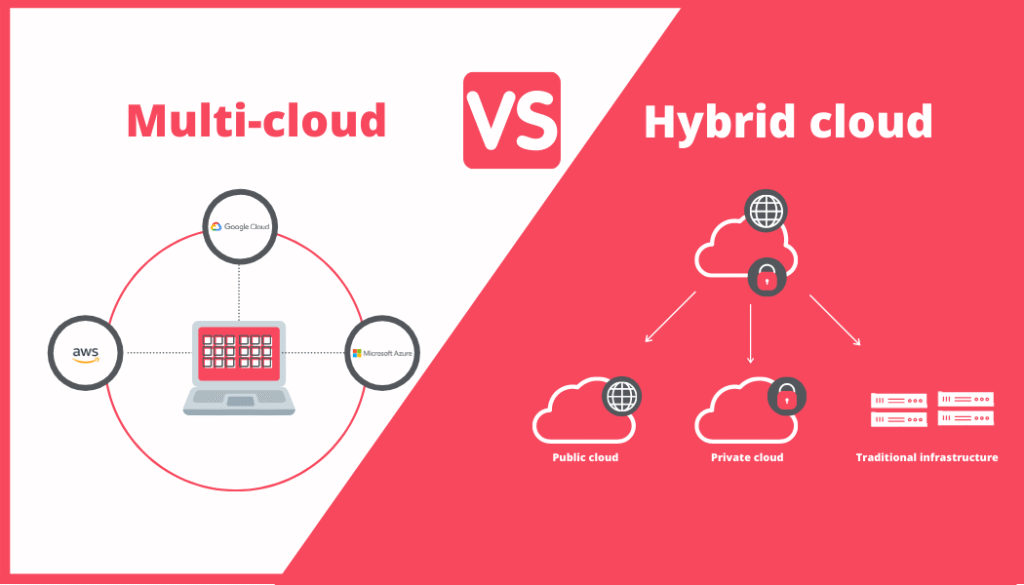Hybrid Cloud vs. Multi-Cloud: What’s Best for Your Data Strategy?

In today’s data-driven world, organizations are increasingly moving away from traditional on-premise data systems and embracing the cloud to boost scalability, flexibility, and innovation. But when it comes to selecting the right cloud model, two options often dominate the conversation: Hybrid Cloud and Multi-Cloud.
Choosing between them isn’t just a matter of IT preference—it’s a strategic decision that directly impacts data security, performance, compliance, and cost efficiency. So, how do you decide what’s best for your data strategy?
Let’s explore the differences between Hybrid Cloud and Multi-Cloud, their benefits, challenges, and how to align them with your business goals.
☁️ What is Hybrid Cloud?
Hybrid Cloud is a computing environment that combines:
- Private cloud or on-premise infrastructure, and
- Public cloud services (like AWS, Azure, or Google Cloud)
These components are integrated to share data and workloads between them, allowing businesses to leverage the benefits of both environments.
✅ Benefits of Hybrid Cloud:
- Data control: Keep sensitive or critical data on-prem while using the cloud for less sensitive workloads.
- Regulatory compliance: Ideal for industries with strict data residency requirements.
- Cost optimization: Avoid overpaying for public cloud storage by managing workloads based on need.
- Flexibility: Move workloads across environments based on performance or compliance needs.
☁️ What is Multi-Cloud?
Multi-Cloud refers to the use of two or more public cloud providers (e.g., AWS + Azure + GCP) without necessarily integrating them with an on-premise or private infrastructure.
Each cloud may be used for different purposes based on cost, performance, features, or regional availability.
✅ Benefits of Multi-Cloud:
- Vendor diversification: Avoid reliance on a single provider, reducing vendor lock-in.
- Best-of-breed services: Leverage the unique strengths of each cloud (e.g., GCP’s AI tools, AWS’s scalability).
- Global reach: Use regional cloud data centers for improved latency and compliance.
- Risk mitigation: Reduce downtime or data loss by distributing workloads.
🧠 Key Differences: Hybrid Cloud vs. Multi-Cloud
| Feature | Hybrid Cloud | Multi-Cloud |
|---|---|---|
| Infrastructure | Mix of private + public cloud | Two or more public cloud providers |
| Integration | Tight integration and workload mobility | Often siloed systems |
| Use case focus | Control, compliance, flexibility | Redundancy, performance, vendor flexibility |
| Deployment complexity | High (integration required) | Moderate to high |
| Example | On-prem server + Azure | AWS + Azure |
🔍 Choosing the Right Model for Your Data Strategy
Your ideal choice depends on the goals and requirements of your business. Here’s a breakdown:
Choose Hybrid Cloud if:
- You operate in highly regulated industries (e.g., finance, healthcare)
- You have legacy on-prem systems that can’t be fully migrated
- You require tight control over certain datasets
- You want to gradually adopt the cloud without abandoning internal systems
Choose Multi-Cloud if:
- You want to avoid vendor lock-in
- Your workloads require specific features from different cloud providers
- You serve international clients and need global coverage
- You aim to optimize performance and cost across cloud platforms
⚠️ Common Challenges
- Complexity: Both models require skilled teams to manage configurations, security, and costs
- Security risks: Multiple environments mean multiple attack surfaces if not managed properly
- Data governance: Ensuring consistent data standards across providers can be difficult
- Monitoring and visibility: Tracking data movement and performance across clouds needs unified tools
🛠️ How i4 Tech Integrated Services Can Help
At i4 Tech Integrated Services, we guide businesses through cloud strategy design, implementation, and management. Whether you’re leaning toward hybrid, multi-cloud, or a combination of both, we offer:
- Cloud strategy consulting to match business goals
- Hybrid & multi-cloud architecture design
- Secure data migration and integration
- Compliance assessments (GDPR, NDPR, HIPAA)
- Unified monitoring and cost optimization tool


